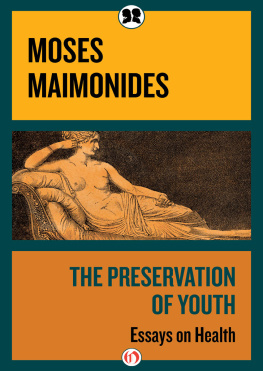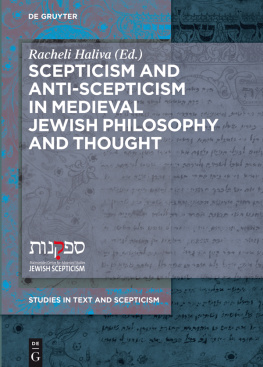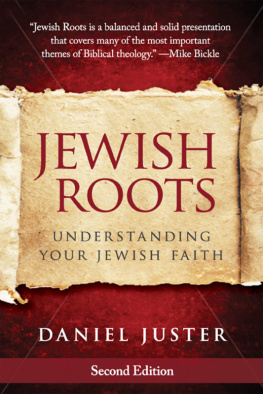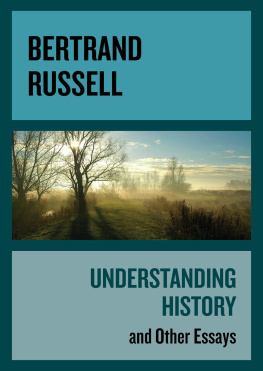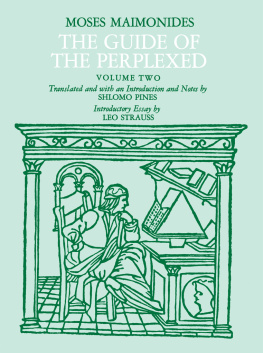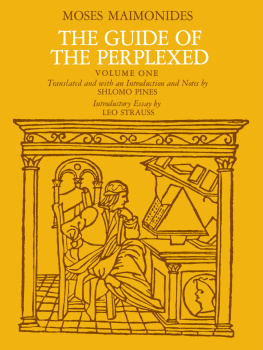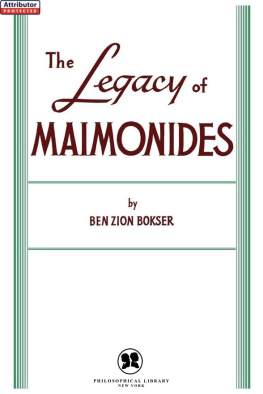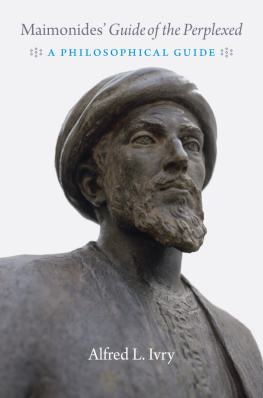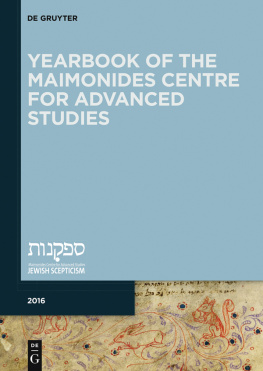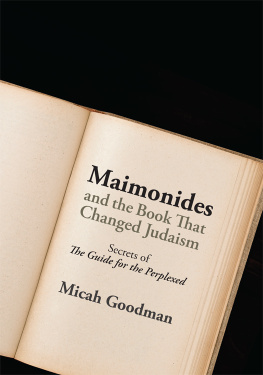The Preservation of Youth
Essays on Health
Moses Maimonides
Translated from the original Arabic
(Fi Tadbir as-Sihha)
and with an introduction by
Hirsch L. Gordon, M.D., Ph.D., D.H.L.

Maimonides as Physician and Medical Author
Maimonides (Moses ben Maimon) was one of the most colorful personalities of the twelfth century. He was an outstanding physician with a very extensive practice, holding, at the same time, important medical appointments in the royal court of Egypt. He was equally eminent as a commentator (Pirush Hamishnah), codifier (Yad), and philosopher (Guide of the Perplexed).
He was born in Cordova, Spain, in 113 5, when it had a population of half a million and was at its height as a cultural and medical center. Because of the persecution of the fanatical Almohades, he had to leave his birthplace when thirteen, trying first to find shelter in southern Spain, and from the age of twenty-three to thirty in Fez, Morocco. While there, he studied medicine with such famous physicians as Ibn Zuhr (son of the famous Ibn Zuhr-Avenzoar) and Abu Yusuf.
Maimonides then, at the age of thirty, left for Egypt where he lived in great fame, and fatiguing medical and literary activities, for the remaining thirty-nine years of his life. He refused an offer made by the English king Richard the Lion-Hearted, in 1193, to accompany him as a court physician to England. He composed ten medical works, all written in Arabic. He died in Cairo, December 13, 1204 at the age of sixty-nine, thus culminating a resplendent career.
His Arabic medical works, of which The Preservation of Youth is the first to be rendered from Arabic into English, are:
1. The Preservation of Youth
2. The Extracts (Gleanings from Galen)
3. Commentary on the Aphorisms of Hippocrates
4. Medical Aphorisms
5. On Hemorrhoids
6. On Sexual Intercourse
7. Discourse on Asthma
8. On Poisons and the Protection Against Deadly Remedies
9. Discourse on the Explanation of Fits
10. Glossary of Drug Names
The works of Maimonides are based on authoritative Greek and Arabic sources, used with critical discrimination, and on his vast personal experience. They excel with their brevity, precision, clarity and rational approach. He used the language of the accepted ancient and medieval hormone pathology in vogue until a century ago and now making a partial and modified return in medicine. The practical application of those theories was sound. He gave preference to personal observation over traditions of the past. He considered theoretical knowledge inseparable from practice, the ultimate aim being the fight against disease and the prolongation of life.
His theology was not in conflict with medicine, but, on the contrary, supported it and lent it prestige. He ridiculed the belief in the occult, demonology, exorcism, amulets and spells, as he did home remedies whose efficacy was not supported by experiment and practice. He considered that medical science held the key to morality and godliness, natural processes being synonymous with the divine. He demanded the highest standard of ethics from the physician and took no remuneration from the indigent.
Many physicians before Maimonides referred to emotional states of the patient, but Maimonides made the interaction of mind and body the cornerstone of his diagnosis and therapy, in true psychosomatic tradition. He dwelt at large on the importance of the measures to prevent disease, on the role of proper diet and on the contribution of constitutional disposition.
The physician should always strive to strengthen the patients own forces, utilizing also the forces of nature. He cautioned against over-medication, especially on a hit-or-miss basis. When in doubt, he advised: leave it to nature. What affects us is not medication alone, but medication plus the forces of nature.
He demanded of the physician detailed examination and close observation. One cannot learn medicine from books alone nor from experience alone. Practice is inseparable from knowledge and speculation. Every patient is a case by himself and demands an individual approach and care.
The medical views of Maimonides as expressed in his medical writings, and also in his philosophical and legal works, do not belong to the curiosa of the medieval healing art, but are an organic part of what was best and enduring in the medical traditions of the past.
H. L. G.
Introduction
The Preservation of Youth was composed in Arabic by Maimonides in 1198, six years before his demise. It was written in Egypt for the Sultan Al Afdal, son of Saladin, at his request. Like all the other medical works of Maimonides, it has never been translated into English until now. It was rendered into Hebrew by Moses Ibn Tibon in 1244, and republished recently with copious notes by Dr. Sssmann Muntner, Jerusalem, 1957. The Latin translation made by John di Capua, a converted Jew, in 1290, and used extensively in the medical schools of Europe, was based on the Hebrew translation.
Six authorities are quoted in this work. Three of them are Greek: Hippocrates, The Prince of Physicians (460-357 B.C. ); Aristotle (384-322 B.C. ); Galen (130-200); and three of them are Moslem (but not Arab): Rhazes (Razi) (850-923) from Persia; Farabi (870-950) from Turkey; and Ibn Zuhr (1113-1162) from Spain. Maimonides often introduces his own opinion as by the author or the servant.
The Sultan complained of poor digestion, chronic constipation and depressive moods. In his reply, Maimonides discusses the dangers of overeating, the three digestions and diets adjusted to the state of health, season and age. He schedules physical exercises and evaluates various foods: cereals, meats, milk, wine, vegetables and fruits. He prescribes a regimen for the healthy, the sick and the convalescent, extols the power of nature and describes the types of physicians in his day. He further discusses mild and drastic remedies, compound and simple drugs, purgatives and emetics. He suggests music as a therapeutic measure and gives directions for various pharmaceutical preparations, such as digestives, sedatives and aphrodisiacs. In a special chapter he discusses the interrelationship between mind and body, also hypersensitivity, philosophy and theoretical morality, the even keel, imaginary good and evil, and the desirability of emotional stability and optimism. In the last chapter he comments on airs and waters, and on the ideas of Al Farabi and Al Razi about patients and diseases. He cautions the reader on the pitfalls of erroneous approaches to medical science. The last topics of his work are concerned with sexual intercourse, the bath, discharges from the nose, food deterioration and the advisability of avoiding sudden changes in the art of living.
H. L. G.
[E D . N OTE: The sub-titles are not in the original Arabic text but were added by the English translator, Dr. Gordon.]
Contents
A L ETTER FROM R ABBI M OSES BEN M AIMON TOTHE S ULTAN (A L A FDAL, THE S ON OF S ALADIN ,1198-1200)
I, the insignificant servant, Moses, the son of Gods servant, the Israelite from Cordova, received a command from a messenger of the Honorable Chief, His Royal Highness, let God increase his Excellence. He ordered his servant to write down the regimen he should follow in the treatment of the diseases that befell my lord. Let God keep illnesses far from him and may the state of health always accompany him. The messenger who brought the lords command reported that my lord complains of chronic difficult bowel movements that take place only after strenuous effort. He also reported occasional attacks of horror, melancholy and the fear of death. This is accompanied by vomiting and poor digestion most of the time. That is what he reported.

